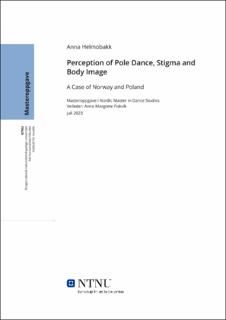| dc.description.abstract | Pole dancing has become a popular trend in recent years, owing to its centuries-old techniques and Western cultural influence. It is performed at various levels of competition by casual students, gym goers, and athletes. Pole dancing has evolved from an erotic form of dance to a popular hobby in the modern world. The first world championship was held in 2005, as it became more of a globally accepted sporting activity. Pole dance promoters and fitness competition organizers have been working to change people's perceptions and stereotypes about pole dancing since the mid-2000s. Pole fitness in its nonsexual form has been advocated for as an acrobatic gymnastics sport, which can be empowering for dancers. This study follows the evolution of pole dance from its origins in strip clubs to its current popular incarnation as a powerful activity and sport enjoyed by many. The study also focuses on how ideological quandaries surrounding issues such as empowerment, stereotypes, control, and intercultural perceptions are managed in various settings. The study's implications will be discussed in relation to redefining and reiterating the evolution of pole dance in the modern world, stigma and body image with a particular focus on Norway and Poland. The data for this thesis was gathered through online qualitative surveys which were then analyzed and interpreted. Pole dancing helps women develop self-acceptance and respect for their bodies, which is important in a society where physical beauty for women is frequently overemphasized and gender roles and stereotypes are common. The findings of the study indicated that engaging in creative leisure activities had a substantial influence on the participants' subjective well-being, resulting in positive psychological alterations and changes in perspective. | |
